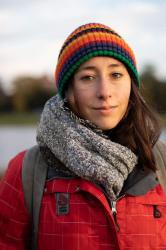An ideal driven laboratory, a creative platform, a community hub, a playground for creatives, an organic and living concept that is difficult to reduce to one meagre sentence. However, its name goes a long way. Fúsk, in Icelandic, means ‘doing something even if you haven’t figured it all out yet.’
We met the people behind the project to learn how the first year has been, and what’s next in store for Fúsk.
So, what is Fúsk?
“It’s a space where you can make your projects happen,” says Edda Karólína Ævarsdóttir, Fúsk’s Co-Founder and Workshop Leader. In fact, although Fúsk often participates in the projects, they stress that it’s more of a resource—people that brainstorm with you and facilitate access to other individuals. Fúsk’s focus is creating a sense of community, and positive change.

Materials and artwork in the warehouse
Designer and RUSL Fest Program Director Elín Margot says they want to welcome projects that will feed and strengthen the community. “You don’t have to be an expert—we want to create a space for people to explore their interests.” Fúsk Co-Founder and member of the Rusl Fest International Partnership, Elsa Jónsdóttir adds: “You can experiment and step out of your comfort zone, sometimes you’ll have to. Sometimes you’ll be scared and sometimes you’ll be excited about it. I mean I had no idea how to build this,” she says referring to the cosy workshop unit we are gathered in. “Now I do, and it seemed much more straightforward than I thought.”

Elsa Jónsdóttir, Artist and Fúsk Co-founder
Fúsk is building a safety net for anyone who might need a push to try new things, or realise a project, so that creatives feel like they can take a leap, without necessarily falling flat on their face.
Big space, big possibilities
The team has built other units, organised the RUSL festival, discussed matters with the Mayor of Reykjavík, and generally laid down a strong foundation to guarantee their survival over time. Fúsk has also reached out to other similar creative initiatives abroad, who have been incredibly helpful. “We can learn from other’s mistakes and experience. They are more well established, we have only been running for a year, it’s still small beginnings,” Elsa says humbly.
One event that took place at Fúsk that illustrates how the project can help artists is Edda Karólína’s own gallery exhibition. “I would have never been able to make this exhibition anywhere else,” she says, explaining she was grateful to have received such an overwhelming response. “Here, you just send out a small call for help, and all these people come rushing,” Edda explains, still in awe of the process.

Edda Karólina Ævarsdóttir, mural artist and Fúsk Co-Founder
“There is something so powerful about building something with all these people that believe in your idea, it’s a strong sense of belonging. Fúsk has just opened up my whole world. I truly feel like I can do anything. When you graduate, you’re quite limited and you don’t know what you are capable of. So much is possible here.”
What now?
Looking to the future, Elsa knows that there is much to be done. The goal is to nurture a stronger community, by becoming a social hub for Gufunes. Elsa reiterates: “Culture is not a number that you can calculate on paper. It is alive and it has to be nurtured”

The Fúsk team and our journalist evade the rain in one of the workshop units they built
The team also wants to build more units in the massive space, with more access to resources, each with a specific focus. Tattooing, metalwork, a sauna—anything really, as long as it serves a purpose for the community and supports the creative scene.
For now there are only three working units and they are looking for people to bring in their own hubs, or containers.
Valuable waste
An important theme that characterises Fúsk is waste. As Elín explains: “Most of our resources come from trash. But it’s not [trash, it’s materials! We are using it and making beautiful things out of it. Everyone can agree that having huge landfills is not good for the environment, so why aren’t there more systems in place to access material before it’s discarded?” Elín believes that everything has value, if you are willing to spend time and energy on it.
RUSL
Fúsk’s upcoming event, the RUSL festival, which translates to TRASH, is all about celebrating makers and designers who are addressing the waste problem through their work. “Many people are doing this, we need to push and give them visibility,” says Elín.

Elín Margot, designer and RUSL Fest Program Director
RUSL grew remarkably from its 2021 debut to this year’s edition, largely due to the astounding response they received. Many connected with RUSL’s ideals. Even those who weren’t makers wanted to contribute. Everyone offered what they could: singing, cooking, lecturing and more. What started out as a dumpster-dive dinner, has now become a week-long festival celebrating the circular economy, sustainable thinking, design, culture and art, with five workshops, and numerous concerts.
Watch the stones please
Through Fúsk, Edda, Elsa, and Elín have learned that many seemingly impossible things can be easy. “An open and creative community is the strongest,” Edda says, and Elsa adds she realised that “it’s possible to have a voice in a larger context, it’s empowering.”
Before we leave, Elsa shares an Icelandic saying that doesn’t quite maintain its poignancy in English: “You don’t trip over mountains, you trip over the stones along the way.”
I wouldn’t worry about Fúsk tumbling though. It is made of exceedingly passionate people, watching their step, while keeping their eye on the peak.
Buy subscriptions, t-shirts and more from our shop right here!



















